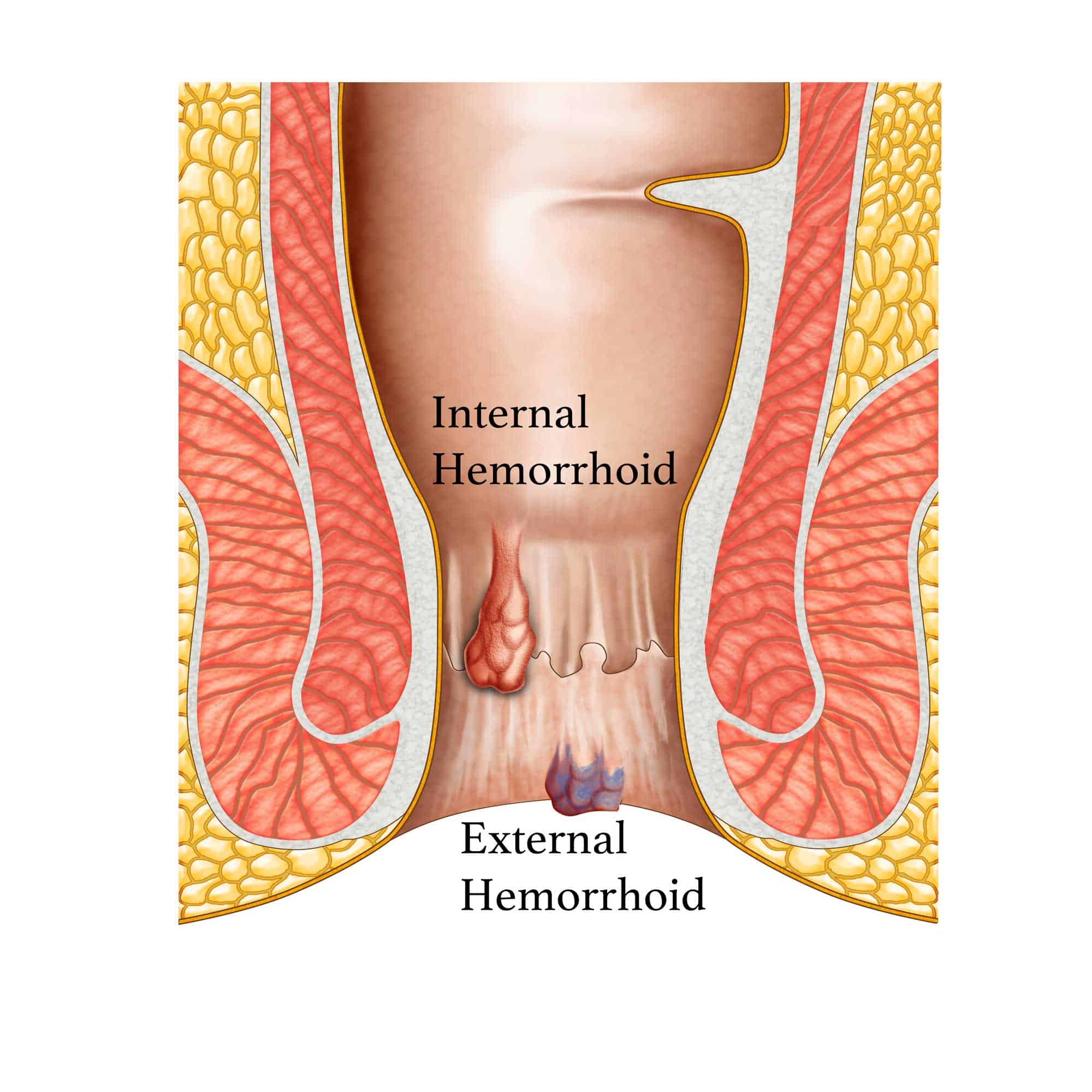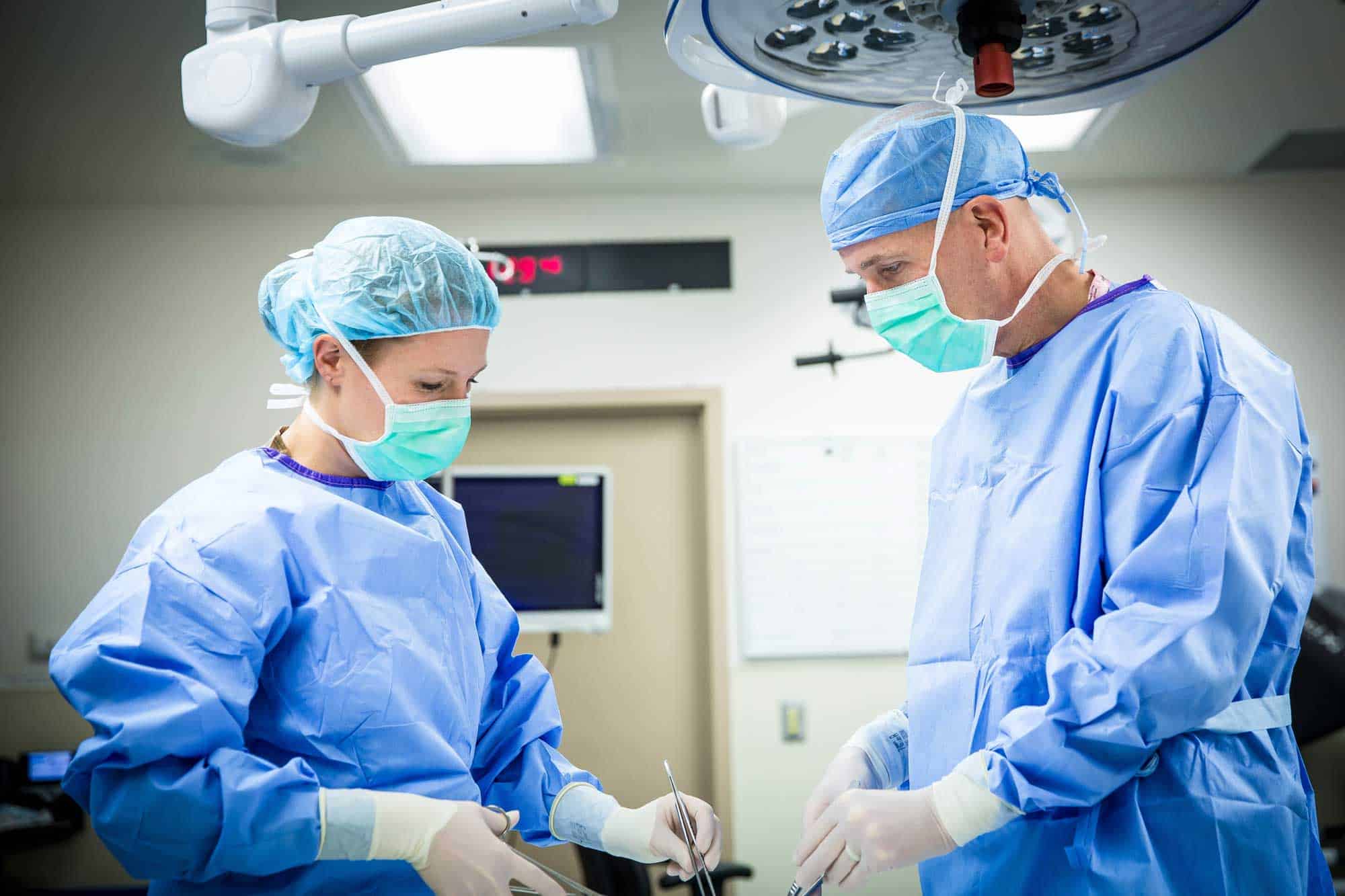Hemorrhoids

What are hemorrhoids?
Hemorrhoids are blood vessels that line the anal canal. These blood vessels are present in everyone, but when they become inflamed or swollen, they cause symptoms. Symptomatic hemorrhoids can occur on the inside (internal hemorrhoids), outside (external hemorrhoids), or both.
What causes hemorrhoids?
Hemorrhoids enlarge over time due to increased pressure within the blood vessels. This can be caused by habits such as straining, constipation, and prolonged sitting on the toilet (i.e. more than 5 minutes). Hemorrhoids can also come on more suddenly from pregnancy or heavy lifting. It’s important to realize that hemorrhoids may develop in the absence of any of these issues or may never develop even when these situations are present.
What are the symptoms of hemorrhoids?
Internal and external hemorrhoids cause different symptoms.
Internal hemorrhoids
Typically cause bleeding without pain.
The bleeding is usually occurs while straining during a bowel movement (BM) and can either be a small amount on rare occasions or a lot with every BM.
Itching and discomfort are also common symptoms from hemorrhoids.
Over time, internal hemorrhoids can swell and protrude out through the anus. When this happens, the hemorrhoids can often be felt on the outside and can bleed even between BMs.
External hemorrhoids
Are indicated by a hard swelling on the outside of the anal canal.
They often come on after straining with a BM, straining with exercise, during pregnancy, or sometimes without any obvious cause.
External hemorrhoids are usually painful but not always.
They can sometimes rupture and bleed, which can ease the pain.
Typically the pain starts to improve after 2-3 days and the swelling starts to resolve after 7-14 days.
When the pain is quite serious, we try to get patients into our office in the first 24 hours since early intervention is best.
External hemorrhoids, unlike internal hemorrhoids, can often be removed fairly easily in the office with local anesthesia (used to numb the skin). Often, it can be addressed in 5-10 minutes.
How do I know if I have hemorrhoids?
You may have a number of symptoms due to the presence of hemorrhoids . However, there are other things that can cause pain or swelling around the anus or blood in the stool. The only way to tell if your hemorrhoids are causing symptoms is to do an exam in the office. If your symptoms do not go away quickly or they keep coming back, call our office or your primary care provider to schedule an appointment. This is especially important if you see blood.

What does an exam consist of?
An evaluation for hemorrhoids consists of an external inspection, a digital exam (placing a finger up inside the anus and rectum), as well as an anoscopy, which is an evaluation with a small scope placed into the anal canal to look at the last few inches of the rectum. All of this can be done in the office.
What if I feel a hemorrhoid but I have no symptoms?
External hemorrhoidal tags or anal tags are chronic, soft protrusions of skin around the anus. These can be left alone if they do not change in size or cause any issues. Sometimes they cause issues with cleanliness, itching, or swelling. If this occurs, they can usually be removed in the office in 5-10 minutes with a recovery of typically a few days. If you are interested in seeing if this is an option for you, please call to make an appointment. Often, we can evaluate and remove the hemorrhoids in the same visit.
What does surgery for hemorrhoids consist of?
Hemorrhoid surgery involves removing the swollen and inflamed vessels within the anus. It is recommended for patients when non-surgical options would not work to resolve your symptoms. Surgery is done as an outpatient, so you can go home the same day, and it typically takes 30-40 minutes. Since there is a high concentration of nerve endings in this area of the body, this procedure can be painful. If you suffer from hemorrhoids, call our office to see what options are best for you.
Is surgery the only option to remove hemorrhoids?
No. There are non-surgical treatments for hemorrhoids.
Sometimes dietary changes can improve symptoms. Topical creams can help alleviate symptoms, but unfortunately, this usually only provides temporary relief.
Rubber band ligation (banding) of hemorrhoids is a very good non-surgical option. It only takes about 5 minutes in the office and typically the discomfort resolves within a day, but occasionally, the pain can last for longer. This requires 3-5 treatments for the best result.
Unfortunately, for larger hemorrhoids, rubber band ligation may not be the best option. If you want to know if any of these are an option for you, call our office to make an appointment.


Can hemorrhoids come back?
Surgery has much longer-lasting results, with hemorrhoids coming back less than 10% of the time. Other, less painful non-surgical procedures have higher recurrence rates, up to 50% at 2 years. Therefore, it is important to improve your bowel movements and avoid triggers for your hemorrhoids to help decrease the risk of them coming back.
